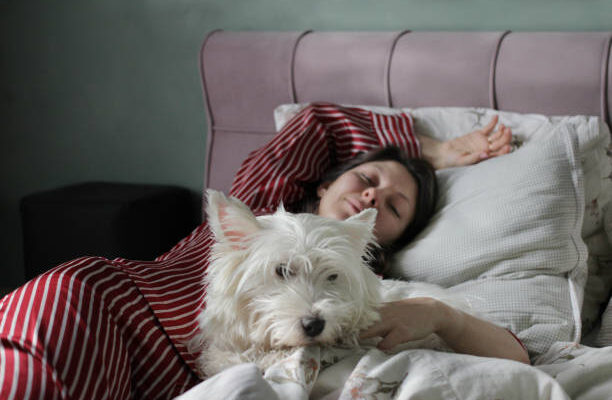As a dog owner for over 15 years, I’ve encountered my fair share of canine quirks and challenges.
However, one issue that has recently been keeping me up at night is my beloved Labrador retriever, Max’s, restless behavior when it’s time to sleep.
If you’re nodding along in understanding, you’re not alone. Many dog owners like us have faced similar nighttime struggles with our furry companions.
You Should Know 15 Reasons Why Won’t My Dog Sleep At Night
- Anxiety: Dogs can experience nighttime anxiety due to various reasons such as separation anxiety, fear of loud noises like thunderstorms or fireworks, or changes in their environment.
- Physical discomfort: Your dog may be experiencing physical discomfort from health issues like arthritis, gastrointestinal problems, or allergies, making it difficult for them to find a comfortable sleeping position.
- Lack of exercise: Insufficient physical activity during the day can lead to excess energy at night, causing your dog to be restless and unable to settle down for sleep.
- Inconsistent bedtime routine: Dogs thrive on routine, so a lack of consistency in their bedtime routine can disrupt their natural sleep patterns and make it challenging for them to relax at night.
- Environmental factors: Factors such as excessive noise, bright lights, or uncomfortable temperatures in your dog’s sleeping area can disturb their sleep and cause them to wake up frequently throughout the night.
- Hunger or thirst: If your dog’s last meal was too early in the evening, they may wake up during the night feeling hungry or thirsty, prompting them to seek food or water.
- Old age: Senior dogs may experience changes in their sleep patterns due to age-related conditions such as cognitive dysfunction syndrome or increased frequency of needing to urinate.
- Boredom: Dogs not mentally stimulated during the day may resort to nighttime activities like pacing or barking out of boredom, preventing them from settling down for sleep.
- Separation anxiety: Dogs with separation anxiety may exhibit nighttime restlessness as they struggle with being apart from their owners, leading to behaviors like whining, pacing, or destructive chewing.
- Medical conditions: Underlying medical conditions such as urinary tract infections, thyroid disorders, or pain from injuries can cause discomfort and disrupt your dog’s sleep at night.
- Unfamiliar surroundings: If you’ve recently moved to a new home or your dog is staying in an unfamiliar environment, they may feel unsettled and have difficulty sleeping until they adjust to their new surroundings.
- Noisy neighbors or outdoor disturbances: External noises such as barking dogs, traffic, or wildlife can disturb your dog’s sleep, especially if they’re sensitive to sound.
- Sleep disorders: Just like humans, dogs can suffer from sleep disorders such as sleep apnea or REM sleep behavior disorder, which can disrupt their sleep cycles and lead to nighttime wakefulness.

- Attention-seeking behavior: Dogs may engage in attention-seeking behaviors at night, such as pawing at their owners or whining, in an attempt to get them to wake up and interact with them.
- Lack of mental stimulation: Dogs that don’t receive enough mental stimulation during the day may have pent-up energy and struggle to relax at night, leading to restlessness and difficulty falling asleep.
FAQs About Why Won’t My Dog Sleep At Night
Why won’t my dog sleep at night?
– There could be several reasons why your dog is having trouble sleeping at night. Including anxiety, physical discomfort, lack of exercise, inconsistent bedtime routines, and environmental factors.
Hunger or thirst, old age, boredom, separation anxiety, medical conditions, unfamiliar surroundings.
Noisy neighbors or outdoor disturbances, sleep disorders, attention-seeking behavior, or lack of mental stimulation.
How can I help my dog sleep through the night?
– To help your dog sleep through the night, consider creating a calm and comfortable sleep environment.
Establishing a consistent bedtime routine, and providing regular exercise during the day.
Ensuring your dog’s basic needs are met (such as food, water, and bathroom breaks), addressing any underlying medical conditions or anxiety issues. And minimizing external disturbances or noises.
Also Read,
- Is Chicken Not Good For French Bulldogs?
- Merle French Bulldog Fever Symptoms Treatment
- What Can French Bulldog Puppies Eat – Guides
Is it okay for my dog to sleep in my bed?
– Whether or not you should let your dog sleep in your bed depends on your personal preferences and your dog’s behavior.
Some people enjoy sharing their bed with their dogs, while others prefer to have their own sleeping space.
If you choose to allow your dog in your bed, make sure they are well-behaved and not disruptive to your sleep.
When should I seek veterinary advice for my dog’s sleep problems?
– If your dog’s sleep problems persist despite your efforts to address them, or if you notice any other concerning symptoms such as changes in appetite, energy levels, or behavior, it’s a good idea to consult with your veterinarian.
Your vet can help identify any underlying medical issues that may be contributing to your dog’s sleep disturbances and recommend appropriate treatment options.
Can certain breeds be more prone to sleep problems?
– While sleep problems can affect dogs of any breed, certain breeds may be more prone to specific issues due to their size, temperament, or genetic predispositions.
For example, breeds with brachycephalic (flat-faced) features may be more susceptible to breathing difficulties that can disrupt their sleep, while high-energy breeds may require more exercise and mental stimulation to ensure restful sleep.
How can I establish a bedtime routine for my dog?
– To establish a bedtime routine for your dog, try to create a consistent schedule for feeding, exercise, and bedtime activities.
Incorporate calming activities such as a leisurely walk, gentle grooming, or quiet playtime before bedtime to help your dog relax and prepare for sleep.
Avoid stimulating activities or screen time right before bed, as this can make it harder for your dog to wind down.
Are there any natural remedies or supplements that can help my dog sleep better?
– Some natural remedies and supplements, such as chamomile, valerian root, or melatonin, may help promote relaxation and improve sleep quality in dogs.
However, it’s essential to consult with your veterinarian before introducing any new supplements or treatments to ensure they are safe and appropriate for your dog’s specific needs.

How much sleep do dogs need?
– The amount of sleep dogs need can vary depending on factors such as age, breed, size, and activity level.
Generally, adult dogs need around 12-14 hours of sleep per day, while puppies and senior dogs may need more.
It’s essential to provide your dog with a comfortable and quiet sleep environment where they can rest undisturbed.
Can my sleep habits affect my dog’s sleep?
– Yes, your sleep habits and behavior can influence your dog’s sleep patterns.
Dogs are highly attuned to their owners’ routines and emotions, so if you have irregular sleep habits or are stressed or anxious, it can affect your dog’s stress levels and sleep quality as well.
Creating a calm and predictable bedtime routine for yourself can help promote better sleep for both you and your dog.
Is it normal for dogs to dream?
– Yes, it’s perfectly normal for dogs to dream during sleep. Just like humans, dogs experience rapid eye movement (REM) sleep, which is when dreaming occurs.
You may notice your dog twitching, whimpering, or moving their paws while they sleep, which is usually a sign that they are dreaming.
Dreaming is a natural and healthy part of the sleep cycle for dogs.
Conclusion
As a seasoned dog owner, I’ve learned that navigating our furry companions’ sleep habits can be as challenging as rewarding.
By understanding the potential causes of Max’s nighttime restlessness and implementing targeted solutions, I’m confident we’ll eventually find a way to restore peace to our household at night.
So, if you find yourself in a similar situation with your canine companion, know that you’re not alone, and with patience and persistence, you can help your furry friend get the rest they need for a happy and healthy life.
Remember, a well-rested dog is a happy dog, and by working together, we can ensure that our beloved companions enjoy sweet dreams and restful nights for years to come.
Also Read,





One Comment on “Why Won’t My Dog Sleep At Night”